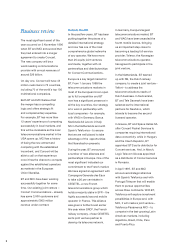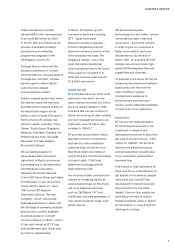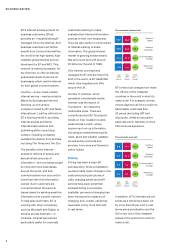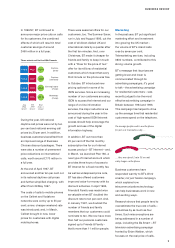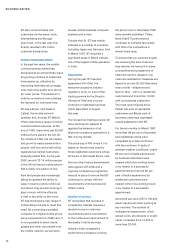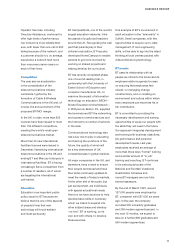BT 1997 Annual Report Download - page 16
Download and view the complete annual report
Please find page 16 of the 1997 BT annual report below. You can navigate through the pages in the report by either clicking on the pages listed below, or by using the keyword search tool below to find specific information within the annual report.FINANCIAL REVIEW
16
In recognition of the contribution made by BT’s
employees, the allocation of £64 million for the employee
share ownership scheme was set by the Board during the
year at 2% of pre-tax profit, compared with a figure of
approximately 1% allocated in previous years.
The depreciation charge increased by 3.5% reflecting BT’s
continuing high level of investment in its network.
Payments to other telecommunication operators grew by
6.7% as a result of BT’s expanding operations overseas and
the growing number of calls terminating on UK
competitors’ networks. Payments to overseas operators
for incoming calls terminating in the UK fell significantly
as a consequence of falling prices and the strengthening
of sterling in the year more than offsetting call
volume growth.
Other operating costs, which rose by 2.8% in the year,
include the maintenance and support of the networks,
the costs of occupancy, marketing and BT’s overseas
operations and the cost of sales of customer premises
equipment. In the UK’s increasingly competitive
telecommunications market, BT is spending significantly
more on its marketing programmes, including extensive
TV advertising, and this has been one of the two main
factors behind the increase in costs. The other has
been the costs incurred in supporting Cellnet’s recent
rapid expansion.
The redundancy costs of £367 million were incurred as a
result of the workforce reductions discussed above. These
costs include £258 million relating to incremental pension
benefits. In view of the surplus in the group’s main
pension scheme described below, redundancy charges for
the year ending 31 March 1998 will not include the costs
of these benefits under BT’s current accounting policies.
Operating profit
Operating profit for the year of £3,245 million was
£145 million (4.7%) higher than in the previous year.
Associates, bond repurchase and interest charge
The group’s £139 million share of profits of associated
undertakings consists primarily of the company’s share of
MCI’s profits less BT’s share of losses in its joint ventures in
Germany and elsewhere in Europe which are in the course
of establishing their businesses. BT’s share of MCI’s pre-tax
profit for the year amounted to £175 million, under BT’s
accounting policies, compared with £101 million for the
previous year which had been adversely affected by a
restructuring charge, BT’s share of which was £73 million.
During August 1996, the company took the opportunity
to repurchase two of the then remaining series of
Government held bonds for £422 million, at an effective
premium of £60 million which has been charged against
profit in accordance with UK accounting standards. The last
remaining series was repaid on its maturity in March 1997.
The repurchase has reduced the overall effective interest
rate on BT’s borrowings.
The net interest charge of £129 million, excluding the bond
repurchase premium, was £41 million or 24% lower than the
interest charge in the previous year. The group’s strong
positive cash flow was the main contributor to this lower
charge which was covered 25 times by operating profit.
Following the completion of the proposed merger with MCI
and the payment of the special dividend described below,
the group’s borrowings will increase significantly and its
interest charge will rise commensurately. Interest cover,
however, is expected to be at a comfortable level.
Profit and taxation
The group’s profit before taxation for the year was
£3,203 million, an increase of 6.1% on the previous year. The
tax charge of £1,102 million as a percentage of profit before
taxation was 34.4%, compared with 34.0% for the previous
year. The higher effective rate in the year was due to the
premium on the bond repurchase not being wholly allowable
for tax relief.
HM Government, newly elected on 1 May 1997, has stated
that it is proposing to levy a windfall tax on those regulated
companies privatised since 1979. The company has no
knowledge whether such a tax will be levied upon it, nor the
basis on which it would be levied or the amount if the tax
was to apply to the company. HM Government has indicated
that it will be announcing tax measures in June or July 1997.


